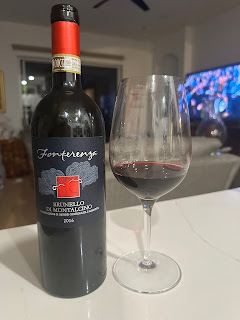I love both the story and the wines of Montalcino so whenever I get a recommendation of a must-try Brunello, I jump at it. Such was the case for the 2016 Fonterenza Brunello di Montalcino and I share my learnings about this wine in this post.
Fonterenza was founded in 1997 by Margherita Padovani and she was joined shortly thereafter by her twin sister Francesca. Neither of the sisters had any grape-growing or winemaking experience but the family owned property in Poggio San Polo, southeast of the town of Montalcino, and they planted their first vines here in 1999. In addition to the vines on Montalcino, the sisters have been purchasing grapes from old vineyards on Mt Amiata and recently invested in their own vineyard on the mountain. The chart below shows the properties from which the sisters source the grapes for their wines.
The Montalcino vineyards are located at elevations ranging between 420 and 450 m and are situated at the meeting point of the sea winds coming from the southwest and the cool currents from the north and northeast. The vines are protected from inclement weather by a combination of Mt Amiata and the forest surrounding the vineyard.
Early on in the process the sisters decided to pursue a minimal-intervention approach in their winemaking venture. That is represented in the vineyard by a biodynamic certification. All work in the vineyard is done by hand and diseases are treated with low doses of copper and sulfur and biodynamic solutions.
On the winemaking front, grapes are de-stemmed and vinified separately, depending on the source vineyard and intended wine type. Wines are fermented spontaneously in oak vats, 10-year-old tubs, or concrete tanks with no additives. Aging is conducted in large oak vats, oak barrels or cement tanks,
I tasted the 2016 edition of the winery's Brunello di Montalcino. This wine was introduced to me by one of my retailers who described the estate as "perhaps Tuscany's best kept secret."
The source vineyard for the wine is shown in the chart above. This wine was macerated for 20 - 30 days and was aged for 47 months in 20- to 50-hl vats.
The wine was superb. A highly perfumed nose with ripe dark fruit, sage, underbrush, an intense and persistent beeswax, and pepper spice on the nose. It flowed beautifully over the palate. Balanced, with a rust character and a slatey minerality. Medium weight with a metallic finish which evolves to a dried tamarind over time. A beaut.
*********************************************************************************************************
I will cover the wines and winemaking of the estate in a subsequent post.


No comments:
Post a Comment